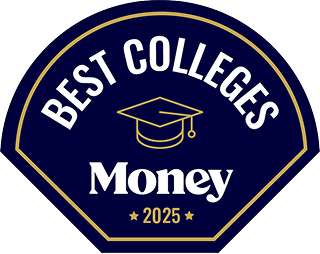Stevens Institute of Technology in New Jersey specializes in interdisciplinary study, boasting 11 core research areas, including business and finance, data science, energy and environment, and resiliency and sustainability. It's probably no surprise, then, that the institute attracts a high-achieving cadre of about 4,000 undergraduate students, many of them from outside of New Jersey.
Stevens has about 30 majors and a host of special programs, including accelerated medicine and law tracks, the Pinnacle Scholars Program and a technical enrichment program for students from diverse backgrounds.
The school can be pricey: Money estimated the net price of a degree before factoring in state or federal financial aid totals about $214,000 — that makes Stevens one of the more expensive schools we evaluated. But its outcomes can make it worth the expense; 87% of students graduate within six years, and median early career earnings for graduates totals $108,000, significantly higher than the median of other similar schools.
There are also over 100 student groups and organizations, including the Anime Critics Union, the Stevens Chess Club and the Midnight Movie Movement. Don't forget athletics: Stevens has 26 Division III teams, plus intramural and club sports. Want to get off campus? Head into Hoboken, also called the Mile Square City, where you can check out grassy green lawns on the Hudson River, browse art galleries, or stop by Carlo's Bakery, the store made famous on the TV show Cake Boss.




